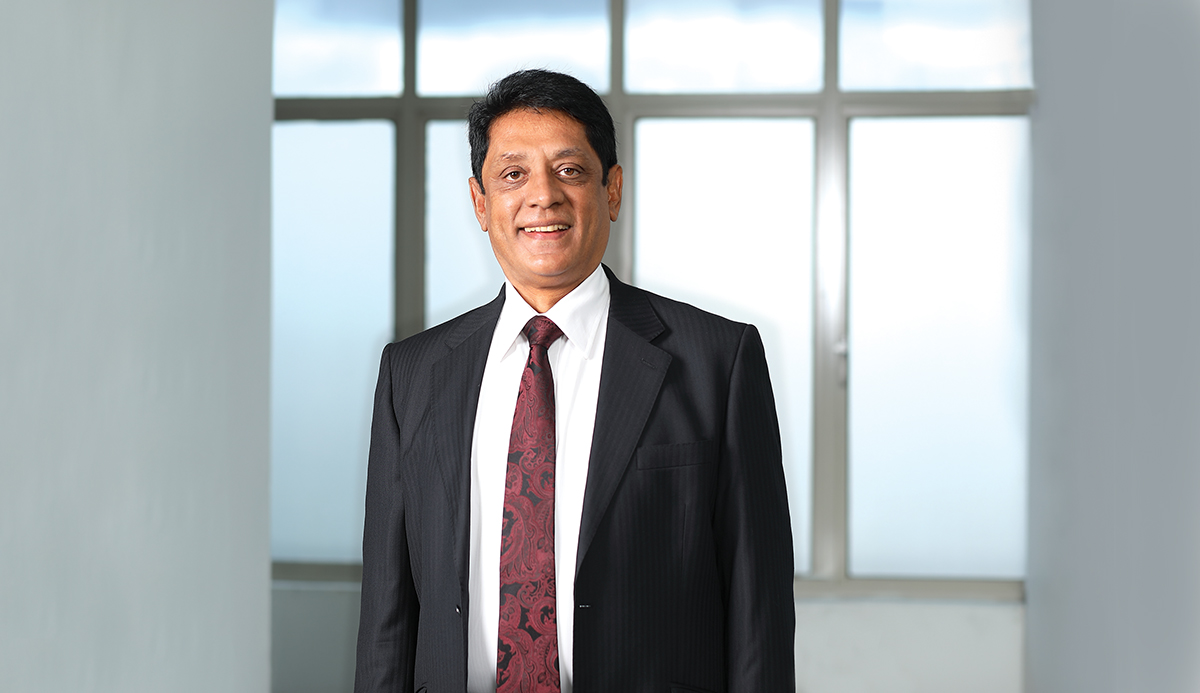Leadership to Bank on
Chairman’s Message

Our key priority will be to improve efficiencies in reaching the masses with new products, in particular the agriculture sector, and also other local industries, cooperatives and SMEs.
SANASA Development Bank, which was rebranded as SDB bank in 2019, was created by the SANASA Movement in 1997 as part of a broader vision of building a social order based on cooperative principles and values. The Bank was one of the four pillars that was expected to facilitate the cooperative movement to enter and compete in the market economy as an alternative force, building and strengthening cooperative enterprises and deepening finance to rural communities. The Bank was to serve as the apex financial institution for the cooperative sector. The uniqueness of SDB bank lies in its core cooperative philosophy of utilising finances for social welfare.
SDB bank’s rebranding, expansion into market segments such as the SME sector, modernisation and digitisation, has not diminished the original objectives and vision of the Bank, and the Bank’s growth strategy remains unchanged. SDB bank continues to maintain a close relationship with the cooperative sector. The Bank is connected to its customers through the SanAsa network and about 29% of deposits originate from this base, which even now, increasing, demonstrating the strength of this connection. However, compared to traditional banks, achieving SDB bank’s vision is indeed a challenging task, as SDB bank needs to maintain a balance between social obligations and commercial gains, to retain its unique identity and objectives.
As described by the theme of this year’s Annual Report, our deep connections with Sri Lankan society became even more relevant during the financial year 2020. The effects of Covd-19 pushed more families over the poverty line and increased the burden of debt of families and small businesses. Rural communities were placed at a greater disadvantage even with regards to the education of their children. While the more affluent urban populations had the means and the tools to access education for their children, rural families did not. Therefore, we can anticipate a widening education gap in Sri Lanka in the future. Against this backdrop, there is a greater need and greater responsibility on the part of SDB bank, towards our society, to promote equitable recovery. However, the world is now more complex and complicated and the Bank has no choice but to develop different and innovative solutions by leveraging modern technologies – which the Bank has managed with great success over a very short span of time.
In the context of financial performance, I believe SDB bank has done exceptionally well, as we have achieved our key objectives for the year, despite the unpredictable operating environment. As a respected and trusted enterprise, good governance has always been a non-negotiable aspect of SDB bank and we continued to update our internal controls and governance structures during the year, backed by a professional and multidisciplinary Board. We have also augmented our capital base by LKR 1.5 Bn., through the first digital rights issue in Sri Lanka, which, I must stress, was heavily oversubscribed, demonstrating the trust our shareholders have in the Bank. To prepare for any challenges we may face in the future, we continued our training and development programmes for the year, and maintained our technology investments to enhance our capabilities in digital banking, to expand our services and to stay connected with our stakeholders, and to connect our customers to essential financial services.
Our model of smart people, smart processes and smart solutions will be used to develop better services and low cost solutions for rural populations. We have also remained within our core tenet of sustainable business practices in our growth strategies. While in this Report, we have adopted the UNSDGs to demonstrate our contributions to sustainable development in the country, the concept of sustainable business is not a new concept to the cooperative philosophy, which is at the heart of our business model. In fact, we have set up a new division for sustainable administration of the business. Our investors, both local and international, appreciate our business model and we have strived to create fair returns for our shareholders. It is indeed noteworthy, that despite the global turmoil experienced during the year, SDB bank has declared dividends for our shareholders.
As a key stakeholder of the Bank, both as a shareholder and customer, we are fully committed towards supporting the advancement of the cooperative sector. A separate Board Subcommittee, including the CEO, has been established to develop the cooperative sector. In the current scenario, the cooperative sector plays a prominent role in driving economic recovery from the grassroots and has been recognised as such, by the Government. Currently, we are discussing with the Government, additional means of supporting the cooperative sector.
Meanwhile, SDB bank is actively giving leadership for SME development in the country by chairing the CA SME Task Force. The SME sector contributes to 52% of GDP and accounts for a large share of employment in the country. However, SME’s only account
for 5% of exports, which is extremely low. Given the strategic national importance of SMEs, SDB bank has signed a 3-year MOU with the Institute of Chartered Accountants of Sri Lanka (ICASL) and the Association of Accounting Technicians (AAT), to develop the SME sector.
Sri Lanka’s SMEs have little, or no formal financial training and poor governance structures, limiting their potential. Many rural SMEs are not registered, do not pay tax, have limited book keeping knowledge and may not even have a bank account. Many also cannot access
formal credit due to lack of collateral and financial records. The CA SME Task Force project will supply a professional accountant from ICASL and AAT, as a mentor, for each SME, free of charge, for one year.
SDB bank will nominate suitable SMEs from the Bank’s customer base for this programme and will also develop governance frameworks, provide technological support and credit facilities, while liaising with national institutions to facilitate opportunities for these businesses. Five SMEs will be selected to be upgraded into exporters. The Bank has already allocated LKR 500 Mn. for cashflow based lending for the SMEs and has reached out to 100 SMEs, with plans to reach 500 SMEs by the end of three years. SDB bank’s close connectivity with these companies
will mitigate risks of lending. SDB bank will also be involved in the formation of a proposed national equity fund, and in developing a national SME database, giving leadership to national imperatives.
Plans for the future
In the new financial year, we will continue to strengthen our capital base, improve governance structures, develop technology-based solutions and focus on training from top to bottom, to take SDB bank to the next level of growth.
Our key priority will be to improve efficiencies in reaching the masses with new products, in particular the agriculture sector, and also other local industries, cooperatives and SMEs. Specialised divisions will be set up at the Bank to facilitate this process. Over the next 3-5 years, under SDB bank’s long-term growth vision, we will consider entering other countries in Asia, using technology platforms.
Plans are underway to raise LKR 4 Bn. from a special secondary public offering (SPO) in June 2021, which will strengthen our capital base to support our long-term strategy. It should be stressed that despite the national rating downgrade, SDB bank has retained its rating of BBB- from ICRA Lanka and BB+ from Fitch Rating, indicating the financial stability of the Bank, in spite of the macroeconomic disruptions of 2020.
Acknowledgements
I would like to acknowledge Ms Samadanie Kiriwandeniya, the former Chairperson of SDB bank, for her leadership during the transformation of the Bank, and the leader of the Sanasa Movement, Dr Kiriwandeniya for his pioneering vision. I also thank the Board of Directors, Management, unions and all our staff for their commitment and dedication, which was instrumental for our success in the current financial year. Under the leadership of the CEO, our officers continued to discharge their duties, sometimes at the risk of their health, to
make sure our customers were taken care of, during these difficult times. I also thank our investors for their trust in us and for investing LKR 1.5 Bn. in the Bank, even at times of extreme uncertainty. At SDB bank we stand for long-term value creation that is sustainable and beneficial for all stakeholders, and as we continue to evolve, I look forward to your continued support towards our shared vision.

Lakshman Abeysekera
Chairman
19 March 2021





